Home » NUSTAR » NUSTAR PRESPEC » FRS Calibration Issue
| FRS Calibration Issue [message #17090] |
Tue, 22 July 2014 19:14  |
 SMilne
SMilne
Messages: 30
Registered: July 2014
Location: York
|
continuous participant |
From: *york.ac.uk
|
|
Hi all,
So, I have been experiencing some weird issues with the final FRS Calibration step for a while now, which has been giving me a skewed 'Z vs A/Q plot' (see attached), but first, I thought I should explain all the steps I have taken prior to this, just in case I've made any mistakes along the way.
The order in which I have performed the FRS calibrations:
1) TPC - Position corrections, check sumgates, etc.
2) TOF - TOF Calibration, beta calibration, etc. using LISE++ Files
3) MUSIC - Aligning raw energy losses, etc.
TPC Calibrations
- Performed position calibrations for TPC21, TPC22, TPC41 and TPC42 using the fiber mask run files.
- Offsets and gains extracted from linear fits to plots of 'correct fiber positions vs raw positions', for the x and y positions.
- Replayed data, all worked fine and centroids are all within ~0.05mm of the correct position. (i.e. see attached example of 'y vs x')
- Checked/adjusted sumgates for experimental data, all fine.
TOF Calibrations
- Produced 4 LISE++ files, including all degrader thickness offsets etc. for 4 different settings in this experiment: 43Ti (isomer calibration setting), 46Ti, 46V, 46Cr
- Extracted LISE++ TOF and Beta values from the 'goodies option' on the tool bar, selecting TOF between S2 and S4 scintillator (which also gave the distance).
- (Beta was found from distance/TOF [this may very well be incorrect, but I can't see how else it can be extracted from LISE++, but then again, I am no expert])
- I then extracted the scintillator TOF_LL and TOF_RR for all these nuclei, from the raw spectra, then plotted 'LISE++ TOF vs raw TOF_LL(or raw TOF_RR)', and from the linear fits, obtained offset and gain coeficients which I put into the 'TofSystem.cal' file.
- Replayed the data for the 4 settings, measured the TOF in the TOF spectrum for all 4 nuclei, which all matched the LISE++ values within 0.4ns.
- I then plotted '(LISE++ Beta x Measured TOF) vs LISE++ Beta', and from the linear fit, the offset(-distance) and gain(time offset) were found and added to the 'TofSystem.par' file.
- Replayed the data, then measured beta for all settings, and all were within 0.16% of the LISE++ beta value.
MUSIC Calibrations [where the issues occur]
- Aligned all the raw energy spectra to an arbitrary value of 900 for the 46Ti setting, changing the gains in 'Music1.cal' and 'Music2.cal'.
- Replayed the data and measured the centroid of the combined raw energy losses for MUSIC1 and MUSIC2 for all 4 settings.
- Plotted 'aligned MUSIC1(or MUSIC2) energy loss vs LISE++ Beta' (see attached) and extraced a, b and c from quadratic fit (a + b*\beta + c*(\beta)^2).
- All seemed fine and added these into the 'FrsId.cal' file then replayed the 46Ti data.
- The end result is attached as well as the PID before this calibration (leaving an old calibration already in place). [where the old PID plot is using an incorrect 'Z_in 35', to get the '46Ti blob' at Z~22 and the new one is using the correct 'Z_in 22' in the FrsId.par file].
Can anyone see where I've went wrong or perhaps where I am mistaken in my current calibration procedure. If you require any more spectra etc. related to the problem, let me know.
Many thanks,
Scott
|
|
|
|
| Re: FRS Calibration Issue [message #17093 is a reply to message #17090] |
Thu, 24 July 2014 09:48   |
 mlcortes
mlcortes
Messages: 41
Registered: July 2014
Location: Darmstadt
|
continuous participant |
From: *ikp.physik.tu-darmstadt.de
|
|
Hi Scott!
Well, the plots of DeltaE vs beta for both musics looks not correct. It seems that the last point you used has somethiong strange.
Which files did you use to make the calibration (if you give me the file number i can check)? There should be at the beginig of the experiment a set of files made explicitly to calibrate. Maybe you should try with those files.
Cheers,
Li^2
|
|
|
|
|
|
| Re: FRS Calibration Issue [message #17096 is a reply to message #17095] |
Thu, 24 July 2014 15:19   |
 mlcortes
mlcortes
Messages: 41
Registered: July 2014
Location: Darmstadt
|
continuous participant |
From: *ikp.physik.tu-darmstadt.de
|
|
Hi Scott,
Usually the FRS calibrations are done with primary beam runs. This is because only for that case you can be sure that you have mainly particles with the same Z entering the MUSICS (not taking into account charged states). Also, this primary beam settings have a smaller velocity spread and are more accurate the make the tof calibration. The runs are the same runs that are used to calibrate the effective matter of the FRS.
So, energy loss of charged particles depends on the charge and on the velocity. If you have the same beam (and then the same Z) with 3 different velocities you can use the energy loss in the musics (that now depends only on the velocity) to find a function (only of beta) for the energy loss (where you should see that for increasing velocity energy loss decreases) and then calculate Z as
Z= Z0sqrt(DEltaE/f(beta))
Here Z0 is the atomic number of the beam you used to calibrate. f(beta) is the cuadratic function that you fit to the plot of DeltaE vs beta. This is the way the code finds Z. I think that as you are mixing files with different values of Z the function that you fit does not depend only on beta and that is why you dont have a proper calibration.
I suggest to use the calibration files and check again. Let me know if you have any problem.
Li^2
|
|
|
|
|
|
| Re: FRS Calibration Issue [message #17304 is a reply to message #17096] |
Wed, 17 September 2014 14:22   |
 SMilne
SMilne
Messages: 30
Registered: July 2014
Location: York
|
continuous participant |
From: *york.ac.uk
|
|
Hi again,
Sorry I have been away for several weeks and only just got back and round to trying these calibrations again. I used the four 58Ni calibration runs for the effective matter, which I made LISE files for. After completing all the FRS calibrations again without any issues (everything matched nearly 100% perfectly with LISE files), I then decided to see how my FRS PID looked for 46Ti with these new calibration settings (and using 'Z_in 22' in the FrsId.par file).
The result is below. I'm still not convinced, maybe I am being naive but I had expected the nuclei to be in the correct place, i.e. for 46Ti, Z=22 and A/Q=2.09. In addition, I don't know what is causing some 'blobs' to look slightly double, my TPC mask calibrations worked perfectly, so don't know what the problem there is. Perhaps my PID is fine and there are some offsets I need to use to simply put it in the right place?
One positive though, at least my PID is not twisted now.
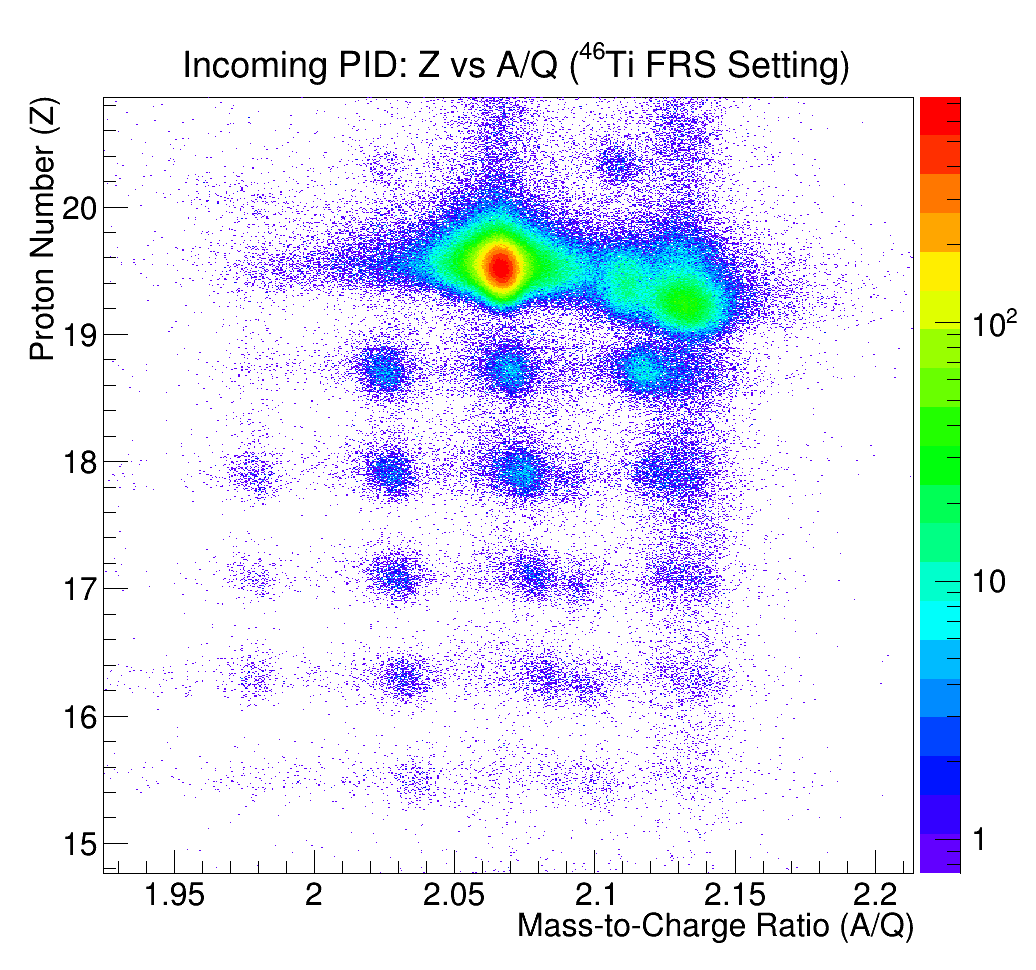
|
|
|
|
| Re: FRS Calibration Issue [message #17305 is a reply to message #17304] |
Wed, 17 September 2014 14:34   |
 mlcortes
mlcortes
Messages: 41
Registered: July 2014
Location: Darmstadt
|
continuous participant |
From: *gsi.de
|
|
Hi Scott!
Is not naive, they should be in the right place. Looking fast at it I see 2 possible things:
First, the Z_in should be the Z of the element you used to make the calibration, so if you used Ni beam Z_in is 28, no matter what isotope you are looking at.
Second, did you put the correct values of the magnetic fields in the B_fields file? Each setting has different B fields, that should be written in the runsheets. Every time you change to a different isotope, you have to change this values.
Also, just to double check that your calibration is good, run again the files you used to calibrate (putting the B fields used in each calibration file) and check that you get Ni in the right place.
Let me know if it works and if you still have the double blobs...
Liliana
Li^2
|
|
|
|
|
|
| Re: FRS Calibration Issue [message #17313 is a reply to message #17306] |
Fri, 19 September 2014 08:01   |
 mlcortes
mlcortes
Messages: 41
Registered: July 2014
Location: Darmstadt
|
continuous participant |
From: *pool.mediaWays.net
|
|
Hi Scott!
Well, there is for sure something wrong in the calibrations, both of beta and Z, from the plots you attach. Unfortunately, only from the plots is impossible to find where the problem is. I don't have the program you mentioned, but I can suggest the following:
During the experiment we used the id calibration from the Kr run. I can see in the logbook that it was working more or less fine. You can compare all the values that you obtain with those values in the online code, and from there you should be able to find which parameters of your calibration are wrong.
If this doesn't work we can start checking the calibration step by step. Let me know how it goes. If it is not too long to wait for you we can check it in detail during EGAN. Otherwise I can take a look this days.
Li^2
|
|
|
|
|
|
| Re: FRS Calibration Issue [message #17330 is a reply to message #17318] |
Sun, 21 September 2014 21:59   |
 mlcortes
mlcortes
Messages: 41
Registered: July 2014
Location: Darmstadt
|
continuous participant |
From: *pool.mediaWays.net
|
|
Hi Scott!
Good to know that you found the problem with the Z calibration!
I looked at your calibrations and all seems to be fine. The only parameter I don't find calibrated is rho_o. This is the path of the central trajectory along the FRS. This value is usually obtained with the minumum matter run and can explain the shift in AoQ that you have.
To check if this parameter is correct, you can take different settings from the logbook and multiply the magnetic field measured (that should be written in the side) times the rho_0 that you are using in you FrsId.par. Take into account that there is one rho_0 for each magnetic field. The multiplication Brho, should be very close to the theoretical values, that are written usually at the bottom of the page after the settings.
If the values differ is because the rho_0 values are not correct and in this case you can find the proper ones.
About getting a position from the scintillators, you can do it using the TofSystemTacCal processor in the FRS plugin. It has as inputs dt_S2lr and dt_S4lr which are the times between left and right PMTs of each scintillator.
processor Frs/TofSystem FRS.TofSystemTacCal
dt_S2lr <- FrsCrate.adc0[0]
dt_S4lr <- FrsCrate.adc0[1]
.....
end
You can plot this values vs the position projected in the scintillator position measured by the TPCs like (i take only as example Sc21)
processor Frs/ScintChecks/S2_x_vs_x UTILS.Pair
first <- Frs/TofSystem.dt_S2lr
second <- Frs/S2tracking.xs[1] ##check where are you projecting according to your S2tracking.par file
display first:second in S2pos_checks 1000,2000,2500:500,-20,20 ## check the range or leave it smart to start
end
The plot you obtain should be a line, correlatind the time difference to the position. You can fit this line in Go4 using the SetProfileX and the FitPanel, and put the coefficients in the file TofSystem.cal. The name of this parameters is cal_x_time_S2 (for Sc21) and cal_x_time_S4 (for Sc41). With this parameter properly set you should be able to see the output x_time_S2 giving you the position. To compare again with position from TPCs:
processor Frs/ScintChecks/S2_calx_vs_x UTILS.Pair
first <- Frs/TofSystem.x_time_S2
second <- Frs/S2tracking.xs[1]
display first:second in S2pos_checks 500,-20,20:500,-50,50
end
One can do the same calibration using, not the time difference between the 2 PMTs, but the difference in the amplitude measured.
Let me know how is it going and if you have more questions. 
Li^2
|
|
|
|
| Re: FRS Calibration Issue [message #17336 is a reply to message #17330] |
Mon, 22 September 2014 19:50   |
 SMilne
SMilne
Messages: 30
Registered: July 2014
Location: York
|
continuous participant |
From: *york.ac.uk
|
|
Hi Liliana!
Thank you very much for your detailed response! So I had a play around with calibrating them Brho values, but it seems they pretty much were fine as they were and only had a very small change on my A/Q value. However, something which had more of an impact was the fact I had been (possibly incorrectly?) including degrader material offsets in my LISE simulations. Not including these, and re-calibrating the TOF, beta and MUSIC seems to give me better results. I'm currently getting between 2.065 and 2.067 A/Q now for my 58Ni calibration points, compared to the 2.071 expected, see below for example.
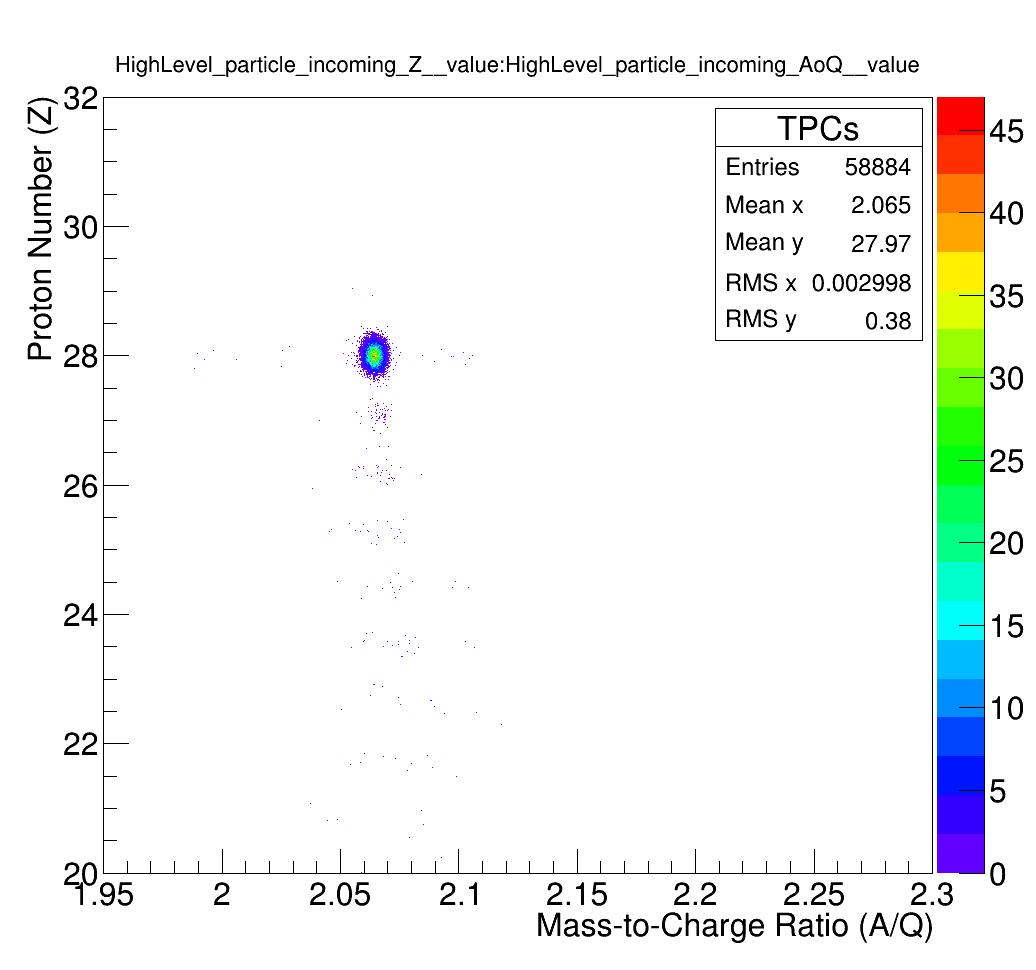
I did as you suggested and added these lines to the code, as well as for Sc41. I only performed a rough calibration (just to test it) since I don't currently have Go4 installed and I'm just using root and don't know how to fit a straight line to these plots. So, I drew a straight line manually in ROOT which seemed about right for the trends in both graphs and then extracted the coefficients for the TOFsystem.cal file. Below I've attached my uncalibrated plots (just so I know they are OK, one seems very flat?) and then the FRS PID using the scintillator positions which you can compare with the PID above using the TPCs. How does everything seem to you?
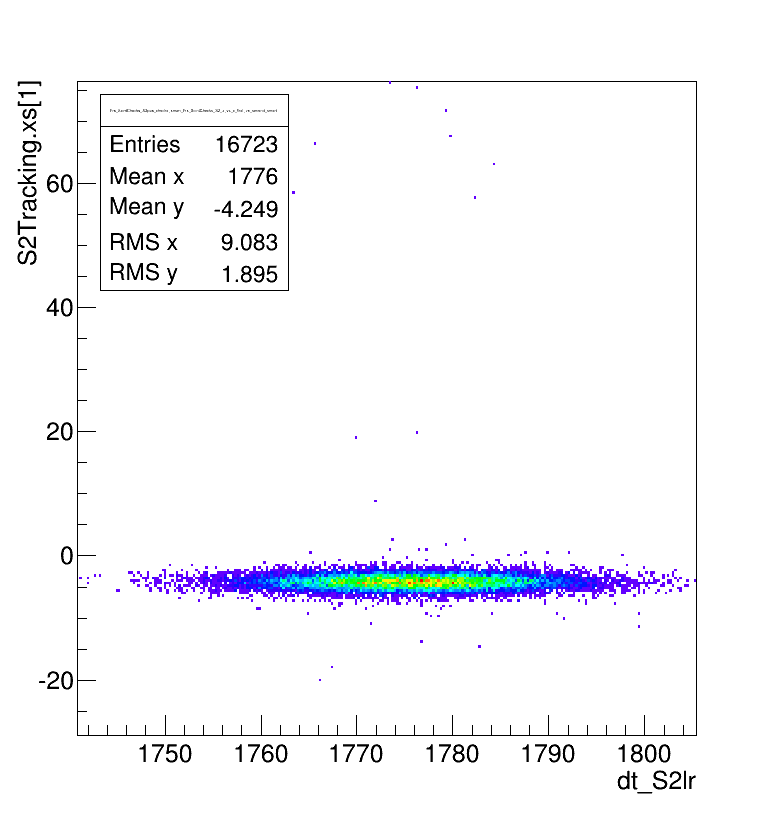
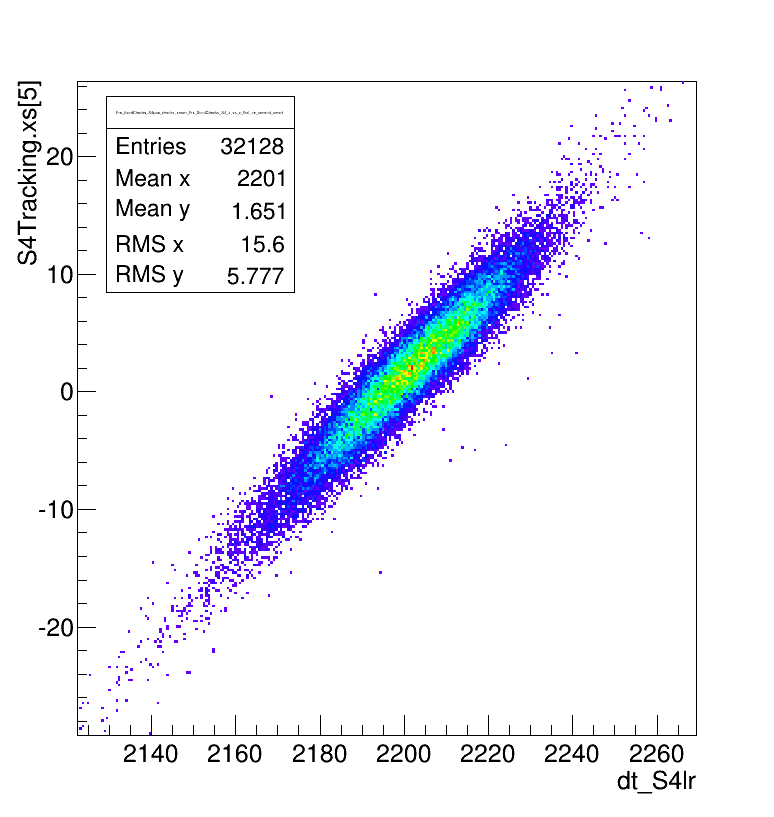
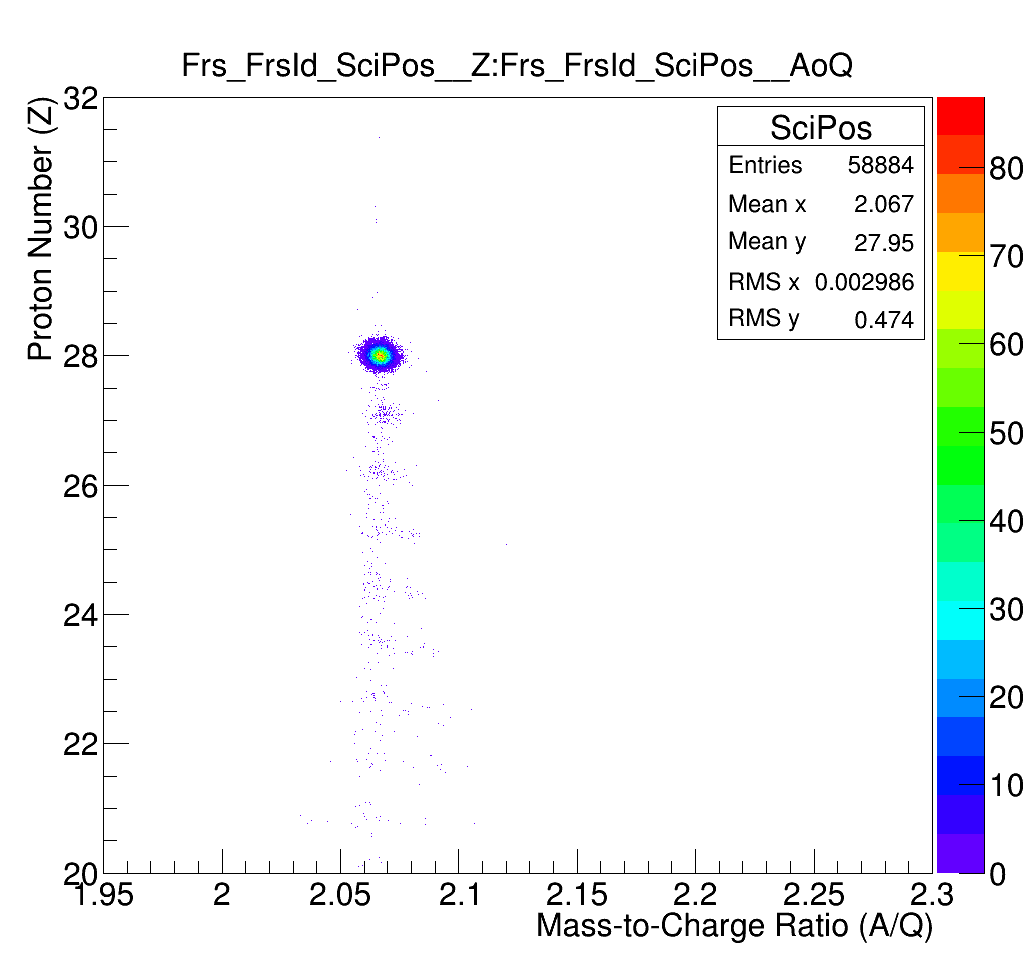
Many thanks,
Scott
|
|
|
|
| Re: FRS Calibration Issue [message #17342 is a reply to message #17336] |
Wed, 24 September 2014 00:10   |
 mlcortes
mlcortes
Messages: 41
Registered: July 2014
Location: Darmstadt
|
continuous participant |
From: *wlan.uni-koeln.de
|
|
Hi Scott!
Good to know you found the problems. Yes, you do not put offsets of degraders in the Lise files. You put only effective target thickness and effective scintillator thickness. Here again you can double check this by taking different settings from the logbook, puting them in the Lise file and checking that the BRhos are equal to the ones written in the logbook.
About the Scintillator position, to know if things are fine it will be important to know the number of counts in the main blob for both ids, then we can know if you are actually gaining something. In any case, Sc21 looks a bit strange.. can you plot energy left vs energy right for both scintillators? This can help in knowing if the detector is fine or if it has any problem.
Li^2
|
|
|
|
| Re: FRS Calibration Issue [message #17346 is a reply to message #17342] |
Wed, 24 September 2014 12:05   |
 SMilne
SMilne
Messages: 30
Registered: July 2014
Location: York
|
continuous participant |
From: *york.ac.uk
|
|
Hi Liliana!
Yeah, I double checked and do indeed get the same numbers.
I assume you meant the number of counts in both 58Ni blobs either using TPCs or Scintillator positions, I get:
TPC: 1.612E4
Scintillator: 3.247E4
Obviously I still need to make a better job of these calibrations, judging from my 46Ti Frs Ids below, before the calibration and after the calibration. Also I forgot to mention, but althouh my Z is perfect for the Ni calibration runs, it comes out as ~22.5 for the 46Ti, perhaps this is not so unusual, the Kr calibrations resulted in the same.
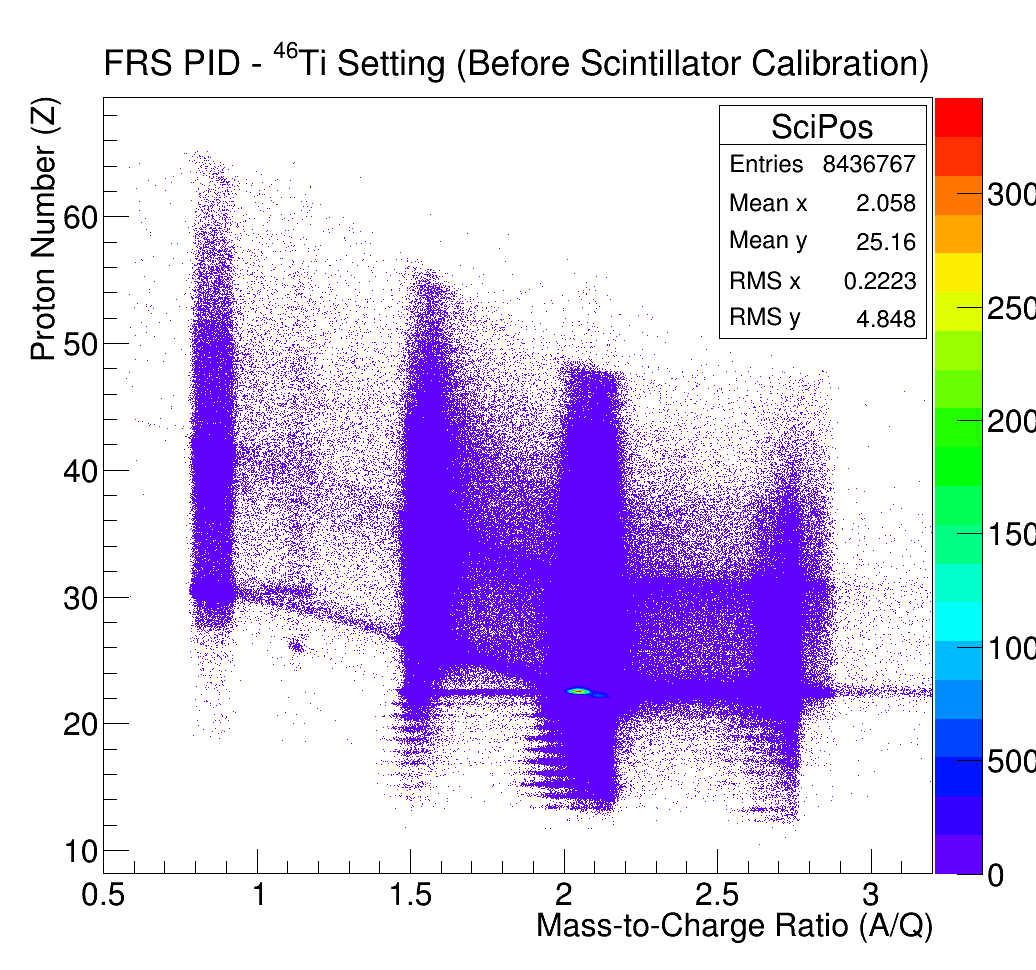
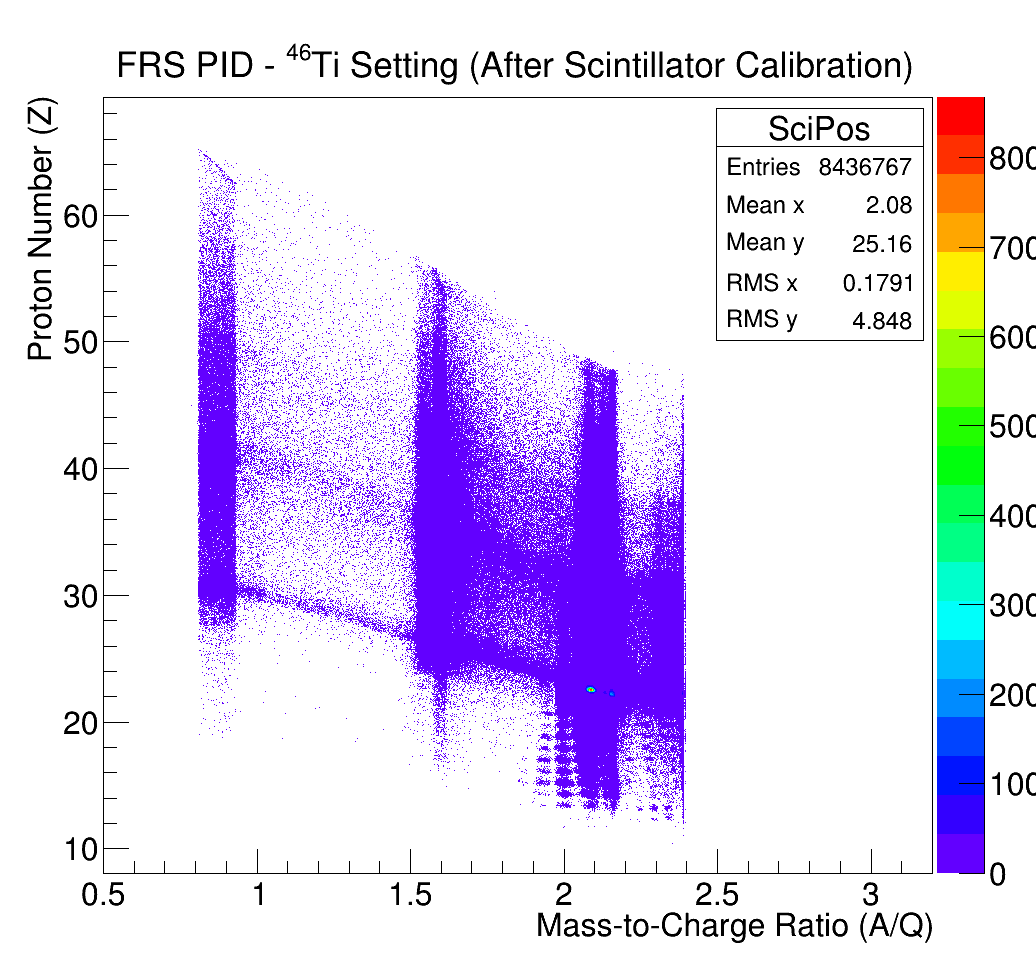
As for a close up, with log Z:
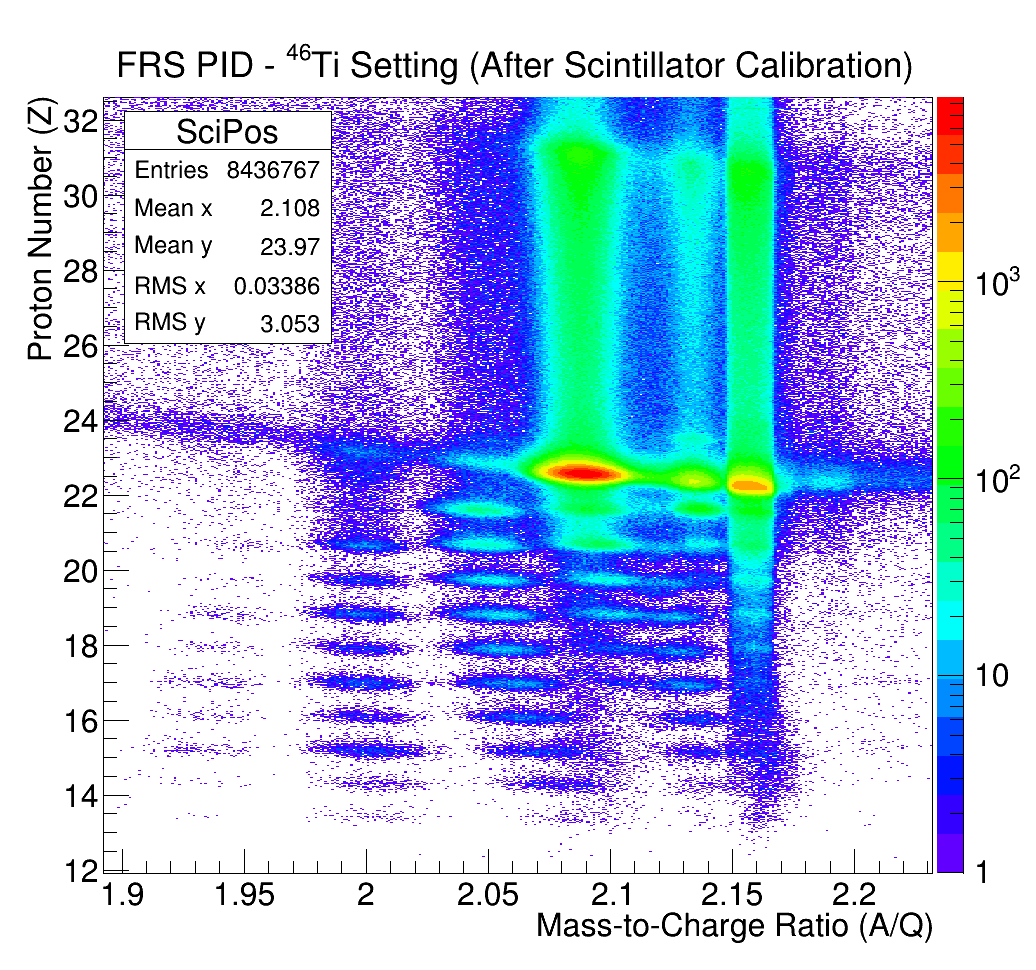
As for the energy left vs energy right of Sc21 and Sc41:
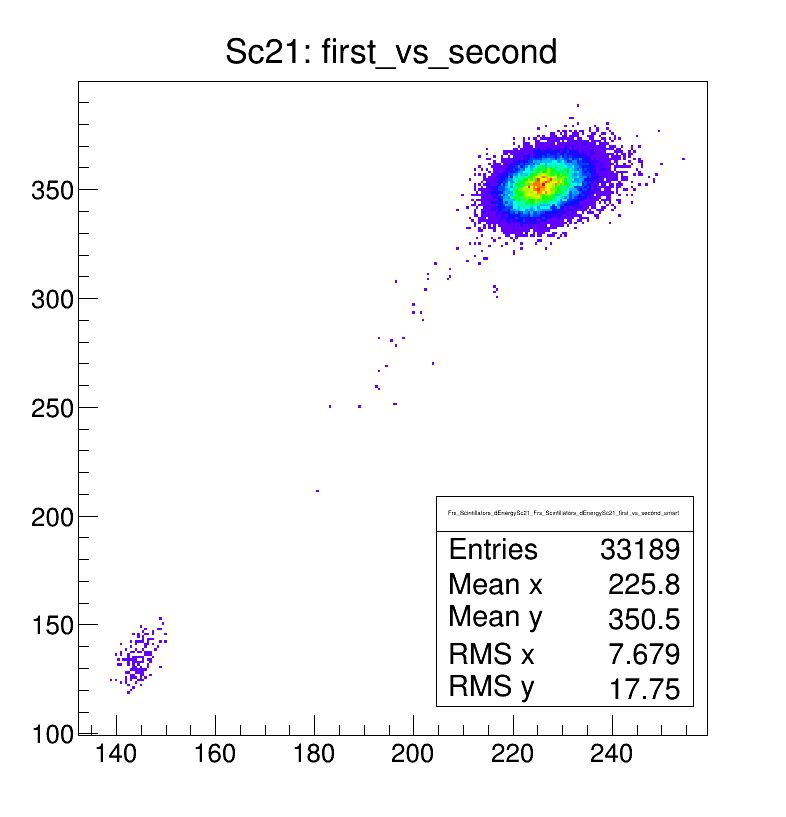
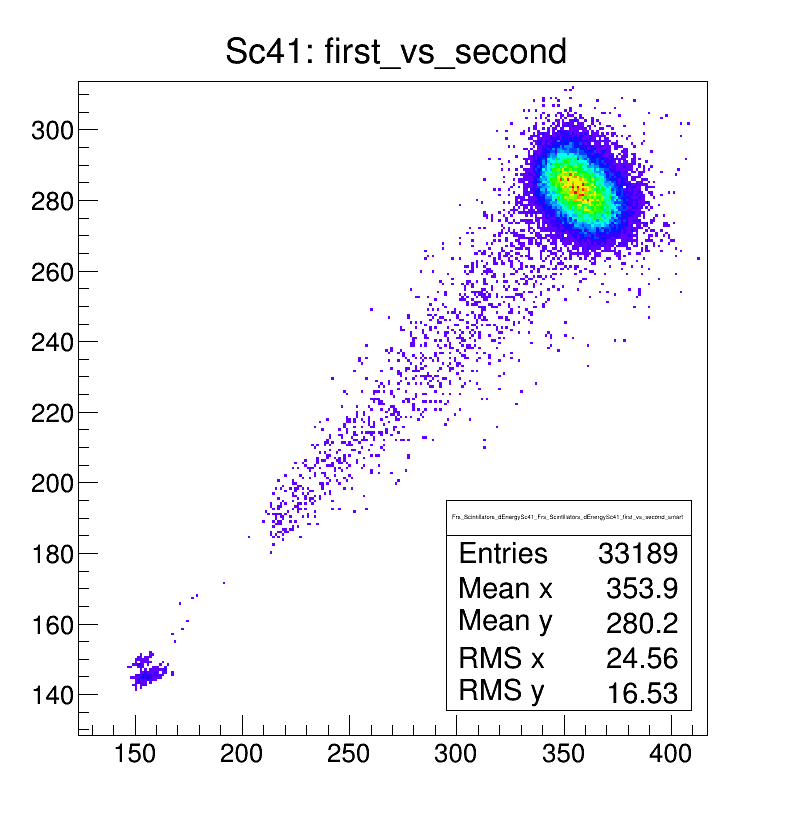
Thanks,
Scott
|
|
|
|
|
|
|
|
| Re: FRS Calibration Issue [message #17766 is a reply to message #17756] |
Fri, 16 January 2015 01:45   |
 SMilne
SMilne
Messages: 30
Registered: July 2014
Location: York
|
continuous participant |
From: *dsl.in-addr.zen.co.uk
|
|
Hi Liliana!
Thanks for your response! No worries about the delay, I've actually been very busy with finishing off some other analysis and writing some papers. 
This response will actually take two posts due to an attachments limit, but at least it is (hopefully) good news.
Just to summarise, the issue is this, when using the TPCs for determining the x positions and therefore the A/Q we end up losing ~80% of the data because the TPCs are too slow (at least for the rates we were using). Therefore we want to use the scintillators, which are faster (although with a worse position resolution), to determine the A/Q. So in short, we are currently trying to calibrate the scintillator positions. The issues, as you will see in my second post, are indeed related to some weird FRS ToF issues, just as you suggested.
Just for your interest I have still produced the spectra which you asked for in case they still serve some purpose.
- TPC Position vs Sc21 dt left-right [raw] (for both the 1st calibration point and the last few runs of 46V)
- TPC Position vs Sc41 dt left-right [raw] (for both the 1st calibration point and the last few runs of 46V)
- TOF for all 4 calibration runs [calibrated] (on the same graph, including a range that covers all entries)
[Updated on: Fri, 16 January 2015 02:12] Report message to a moderator |
|
|
|
|
|
| Re: FRS Calibration Issue [message #17768 is a reply to message #17767] |
Fri, 16 January 2015 13:49   |
 mlcortes
mlcortes
Messages: 41
Registered: July 2014
Location: Darmstadt
|
continuous participant |
From: *ikp.physik.tu-darmstadt.de
|
|
Hi Scott!
Your scintillator plots look fine and I understand that you are happy now witht he position calibration.
So, to answer your questions:
- Usually, in the last bin you accumulate all the events with a Tof higher than the range of the TDC. From your spectrum I see you are close to the end of the range, so you can have many events with higher Tof.
-About your id, it looks decent, but of course there are ways to improve it.
The first thing you can do is plot the AoQ vs S4 position. If everything is fine this should be a straight line.
I see from an older post where you have an id plot with AoQ between 0.5 and 3.5 that you have a lot of event out of the main area. To try to improve this, and also to see the event out of the range of the TDC you can use the MhTDC instead of the TAC.
Also, if the efficiency of TPCs at S4 is not a problem you can use a cut in the S4 position vs time left-right. The points out of the line are more likely contributing to the background.
About the shift on the MUSICS, you can try to check energy loss vs S4 position for each calibration file. There may be a small dependance that can be corrected.
Hope it is useful for you and let me know how it goes,
Liliana
Li^2
|
|
|
|
| Re: FRS Calibration Issue [message #17769 is a reply to message #17090] |
Fri, 16 January 2015 19:35   |
 SMilne
SMilne
Messages: 30
Registered: July 2014
Location: York
|
continuous participant |
From: *york.ac.uk
|
|
Hi Liliana!
Ahh, I see. Could you please explain how I can change to using MhTDC instead of TAC, I couldn't work it out. 
As for your other suggestions:
- I plotted AoQ vs S4 position and do indeed get straight lines (see attached)
- I performed the cut you suggested and applied it to the FRS PID (using scintillators), it does appear to clean it up nicely though it does reduce it by quite a few statistics, I'll need to investigate next week just exactly how many of them statistics are from the 46Ti 'blob', my cut was quite rough though. I put in the FRS PID (using the TPCs) for a comparison, there is a factor of ~3.5 less stats in the PID compared to using scintillators (+cut on S4 position vs dt left-right).
- Finally I've plotted all the energy losses vs position for the four 58Ni calibration runs, there is possibly a slight dependence.
Thanks again, have a nice weekend!
Scott
-
 Attachment: FRS-PID.zip
Attachment: FRS-PID.zip
(Size: 622.19KB, Downloaded 431 times)
|
|
|
|
| Re: FRS Calibration Issue [message #17771 is a reply to message #17769] |
Mon, 19 January 2015 13:10   |
 mlcortes
mlcortes
Messages: 41
Registered: July 2014
Location: Darmstadt
|
continuous participant |
From: *ikp.physik.tu-darmstadt.de
|
|
Hi Scott,
About the AoQ vs S4 position, what about zooming a bit around the region that is interesting?
For the rest, you can play a bit and see if it improves your id. As I said before, still improvements in id are for sure possible, but it doesn't prevent you from seeing already gamma spectra.
In any case, is good to check the isomers that you have to check that id is right.
Now for the MhTDC, this is not easy to explain. I was looking in my code and I found a couple of things that can be improved (The scintilators were my first MhTDC processors). I will try to clean up a bit the mess and then I will reply to you about this point.
In any case, is not a bad idea to read the Caen1290 manual, at least to start understanding them.
Edit: In this entry you can also find info about the MhTDC
https://forum.gsi.de/index.php?t=msg&th=4426&start=0&
Cheers,
Liliana
Li^2
[Updated on: Mon, 19 January 2015 14:20] Report message to a moderator |
|
|
|
|
|
|
|
| Re: FRS Calibration Issue [message #17867 is a reply to message #17812] |
Tue, 10 February 2015 17:09   |
 SMilne
SMilne
Messages: 30
Registered: July 2014
Location: York
|
continuous participant |
From: *york.ac.uk
|
|
Hi Liliana,
Thanks a lot for your response and apologies for my delayed response!
So I tried using your new processor the other day and recalibrated my FRS ToF using the '58Ni calibration point' files and all seemed to be going well, things calibrated nicely as expected (see the attached 58Ni FRS Id spectra in the MhTDC and TDC folders for a comparison). Anyways, with this working, I decided to use it for the 46Ti run, but for some reason the calibrations did not work here, see the attached spectra in the ToF folder. I'm also confused why this TOF spectrum 'reverses' after the gate, this does not happen in the case of 58Ni. Maybe I am doing something silly, I don't know. Do you know why this is not working? (If you require any other spectra, just let me know)
Many thanks,
Scott
|
|
|
|
| Re: FRS Calibration Issue [message #17875 is a reply to message #17867] |
Thu, 12 February 2015 10:05   |
 mlcortes
mlcortes
Messages: 41
Registered: July 2014
Location: Darmstadt
|
continuous participant |
From: *ikp.physik.tu-darmstadt.de
|
|
Hi Scott,
Well, the diff_visu looks already bad, so let's solve this first and then we go for the reversed gate. Can you please let me see your config file and also plot from the crates the inputs you are using? That will be in the example LyccaTargetTofCrate.mhtdc0 channels 16. 18, 20, 22.
Cheers,
Liliana
Li^2
|
|
|
|
|
|
| Re: FRS Calibration Issue [message #17907 is a reply to message #17879] |
Tue, 17 February 2015 12:06   |
 mlcortes
mlcortes
Messages: 41
Registered: July 2014
Location: Darmstadt
|
continuous participant |
From: *ikp.physik.tu-darmstadt.de
|
|
Hi Scott,
Sorry for the delay.
The crates look fine, but the diff_visu does not. I think I know what it it.
First, just to check that is not a more fundamental error in the processor, please include the following lines in the config file
display hit_mult 100,0,100 in TofSystemMhTDC/Multiplicity
display hit_number_Sc21l 40,0,40
display hit_number_Sc21r 40,0,40
display hit_number_Sc41l 40,0,40
display hit_number_Sc41r 40,0,40
And show me the resulting histogram.
Second, are you sure you have the correct parameter file? So, that you have the correct number of ns_per_channel?
Finally, you mentioned that for the calibration files the timing from the processor looked fine, so can you please sent me the data from the crates for one of the calibration files? Please also send me the diff_visu for this case just to be sure.
I think the problem is that the cabling was changed or delays modified. For me the time difference is negative, so I have a condition only on negative values (to save processing time), but I think for you it is positive.
I didn't considered this possibility before, but now I can improve the processor.
I will wait for your spectra to confirm the problem and if it is clear I will modify the processor to fit both of us.
Cheers,
Liliana
Li^2
|
|
|
|
|
|
| Re: FRS Calibration Issue [message #17910 is a reply to message #17909] |
Tue, 17 February 2015 15:31   |
 mlcortes
mlcortes
Messages: 41
Registered: July 2014
Location: Darmstadt
|
continuous participant |
From: *ikp.physik.tu-darmstadt.de
|
|
Hallo again,
Checking the crates, I think is very likely that the problem was to reject positive values.
I just removed the condition and pushed the file. You can just pull, compile and run again.
After that, let me see your diff_visu for both right and left PMTS from your production run.
If this works fine, your calibration will change and it means that something in the MhTDCs was changed between the calibration and the run.
One should check when the change was and how it affects you.
Let me know if it goes fine.
Liliana
Li^2
|
|
|
|
|
|
|
|
| Re: FRS Calibration Issue [message #17947 is a reply to message #17090] |
Thu, 26 February 2015 01:12   |
 SMilne
SMilne
Messages: 30
Registered: July 2014
Location: York
|
continuous participant |
From: *dsl.in-addr.zen.co.uk
|
|
Hi Liliana!
No worries, it is easily done! 
Maybe for once I bring you good news. I had to re-do the ToF calibrations using the beam runs instead, since the 58Ni calibration were not quite right, which may have had something to do with them having negative ToF values.
Anyways, I've attached my resulting Frs Ids for 46Cr (using either the scintillators or TPCs and using the MhTDCs) as well as the Frs Id (using the TPCs and TDCs). They are looking much better and the 'repeated Id plot' using the scintillators seems to have disappeared. I know the separation between 46Cr and 47Cr is not great using the scintillator, but it is what it is, I can also play around with using the TPCs at S4, where the rate should not be so bad. I will also probably have to adjust my time gates slightly to remove the slight horizontal lines across the Frs Id plot. Anyways, if I encounter any more issues I'll let you know.
Thanks again for all your help, I really appreciate the time you've spent helping me with all these issues!
Best regards,
Scott
|
|
|
|
|
|
| Re: FRS Calibration Issue [message #18253 is a reply to message #17956] |
Wed, 20 May 2015 12:19   |
 SMilne
SMilne
Messages: 30
Registered: July 2014
Location: York
|
continuous participant |
From: *york.ac.uk
|
|
Hi Liliana!
Hope you are well! I just wanted to ask you a question regarding the MhTDCs since it has been bugging me for a while and I've ignored it up until now and used TDCs in this case. Basically it seems something strange occurred during the 46Ti Coulex runs which doesn't appear to affect the other beam runs. The problem is during certain periods of the beam run, the Frs Id completely shifts to a different place, something I don't see using the TDCs (see attached "shifted-46Ti"). Whilst it is not restricted entirely to specific lmd files, it does mainly occur in runs 14,15,16,17,38 and 39, whereby the experiment started from run 14. The fact it reoccurred later is perhaps odd, but the shift as I've checked is the same in all these runs. One way I've tried to solve this issue (see attached "corrected-Id") is by creating a separate FRS calibration for these runs, calibrating the different blobs ToF in the shifted Id to those of the same blobs but in the correct position. Whilst this works, it is of course a hassle having to sort data with different FRS calibrations, plus as mentioned the issue is not purely restricted nicely within particular run files so still some shifted Id remains.
Are there any reasons which you can think of which might be causing this and if so can they can be solved or if my method above is the only way to deal with it?
Thanks,
Scott
|
|
|
|
|
|
| Re: FRS Calibration Issue [message #18268 is a reply to message #18264] |
Fri, 22 May 2015 13:27  |
 mlcortes
mlcortes
Messages: 41
Registered: July 2014
Location: Darmstadt
|
continuous participant |
From: *ikp.physik.tu-darmstadt.de
|
|
Hi Scott,
Sorry for the late reply. So, at the end you found the way with the MhTDC and the issues is not scintillator at S2. Is that correct?
You can plot for different runs the charge in one PMT of Sc21 vs the charge in the other one without any gate. This plot should look more or less the same for each file.If at some point the amplitud starts to get too small you it is an indication of rate-related problems in the scintillator or in one of the PMTS. You can also check the scintillator by plotting Qleft/Qright vs (time left-time right).
Hope this helps.
One more thing. Please, make a new thread!! As I told you before, this is too long and it is better if different issues are posted with more describing titles so some other people can benefit.
Li:
Li^2
|
|
|
|
Goto Forum:
Current Time: Tue Feb 03 09:57:51 CET 2026
Total time taken to generate the page: 0.01280 seconds
|
 GSI Forum
GSI Forum